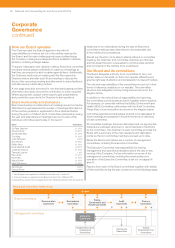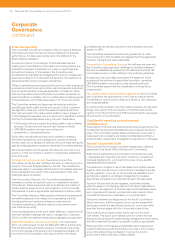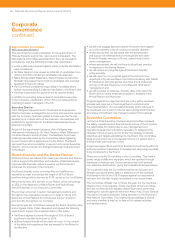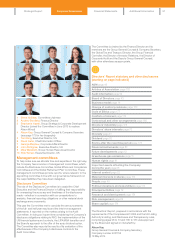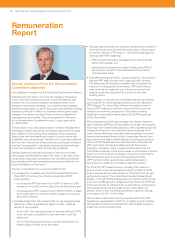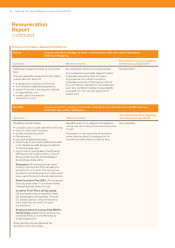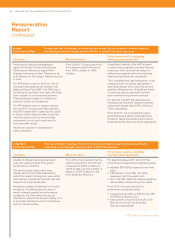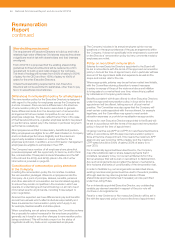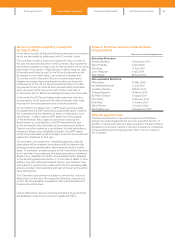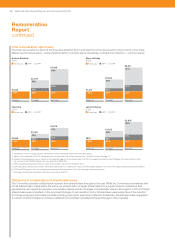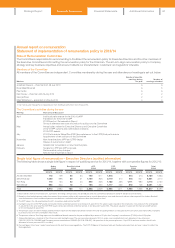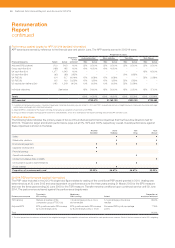National Grid 2014 Annual Report Download - page 60
Download and view the complete annual report
Please find page 60 of the 2014 National Grid annual report below. You can navigate through the pages in the report by either clicking on the pages listed below, or by using the keyword search tool below to find specific information within the annual report.
Remuneration
Report
Annual statement from the Remuneration
Committee chairman
I am delighted to present my first Directors’ Remuneration Report.
Following the introduction of a new UK regulatory framework
in2013 and the continued evolution of our US business, last
summer the Committee initiated an extensive review of our
executive remuneration strategy. Our objective was to assess
whether the principles on which the current remuneration strategy
is based continued to reflect our business drivers given recent
changes. Ourreview concluded that a number of significant
changes wereappropriate. They are presented in this report
forour shareholders’ consideration and, I hope, approval at
our2014AGM.
The key factor in our discussions was to enhance the alignment
ofinterest between executives and shareholders over the longer
term. National Grid is a long-term business, where decisions
taken today can have significant impact on performance and
profitability over several years. Therefore the Committee believes
that the bulk of incentives to executives should be paid in shares
and that it is essential for high levels of personal shareholdings
tobecome mandatory, rather than simply guidelines.
Having reached provisional conclusions I wrote to a number
ofourlarger shareholders to seek their views. In the light of the
constructive responses we received, the Committee amended
itsproposals and these amendments are incorporated into the
recommendations in this report.
The key components of our recommendations are:
• A rebalancing of variable pay from the Annual Performance
Plan (APP) to the Long Term Performance Plan (LTPP).
It is proposed:
– to reduce the APP maximum from 150% of salary to 125%
ofsalary for the CEO and the other Executive Directors; and
– to increase the LTPP maximum from 225% to 350% of salary
for the CEO and from 200% to 300% of salary for the other
Executive Directors.
• Increased alignment with shareholders by requiring Executive
Directors to retain a significantly higher number of shares
earned. It is proposed:
– for the CEO, the new requirement is a shareholding of 500%
of pre-tax salary, equivalent to over nine years’ post-tax
salary; and
– for theother Executive Directors, the new requirement is a
shareholding of 400% ofpre-tax salary.
• Stronger alignment with our business model and the long-term
value drivers around a dividend-led total return. It is proposed
to move to twokey LTPP metrics – RoE (50% weighting) and
value growth (50%weighting):
– RoE is aimed at focusing management on driving profits
within the business; and
– value growth is viewed as a clearer indicator than EPS of
thelong-term growth of the business and the creation
ofshareholder value.
• Extended holding periods for incentive awards. It is proposed
that any APP award is paid half in cash and half in shares.
Theshares would be paid immediately and be subject to a
minimum holding period of two years. LTPP performance
metrics would be measured over a three year period and
awards would then be subject to a minimum two year
holdingperiod.
The Company’s commitment to increasing the annual dividend
by at least RPI for the foreseeable future would be reflected in
LTPP awards. The Committee will have the explicit power to
reduce LTPP vesting should the Company fail to honour the
dividend commitment, irrespective of the level of vesting
resultingfrom the performance against the LTPP targets set
bythe Committee.
The consequence of all these changes is to reduce near-term
cash incentives (APP) and tilt the balance to longer-term awards
and longer-term shareholding exposure, with a greater proportion
of Executive Directors’ remuneration earned in shares. As a
result, we are striking an important balance between long-term
reward and increased financial risk to executives through very
high levels of mandatory shareholdings. In setting the quantum
of future LTPP awards we have taken account of the reduced
APP opportunity and longer holding periods that we are
proposing. However, I want to assure shareholders that the
Committee’s intention is that any increase in remuneration should
arise from commensurate increases in long-term performance.
We will therefore seek to ensure that targets set for the
LTPPmetrics contain appropriately demanding levels of
performance to justify any increase in executive reward.
For the 2014 LTPP award we are proposing that maximum
payout would require an average annual Group RoE of 12.5%
and an average annual value growth of 12% over the three year
performance period. TheCommittee considers these stretch
targets, in the light of the business plan and recent performance,
to be more challenging to management than those for LTPP set
in the recent past. To achieve such a performance would require
incremental Group pre-tax profits of over £250 million per
annum, which in turn would imply achieved customer savings
inthe region of £100 – £200 million.
We can also confirm that, had the proposed APP andLTPP
targets been applicable for 2013/14, no higher level ofincentive
remuneration would have resulted than was actually achieved
under the current arrangements.
58 National Grid Annual Report and Accounts 2013/14


